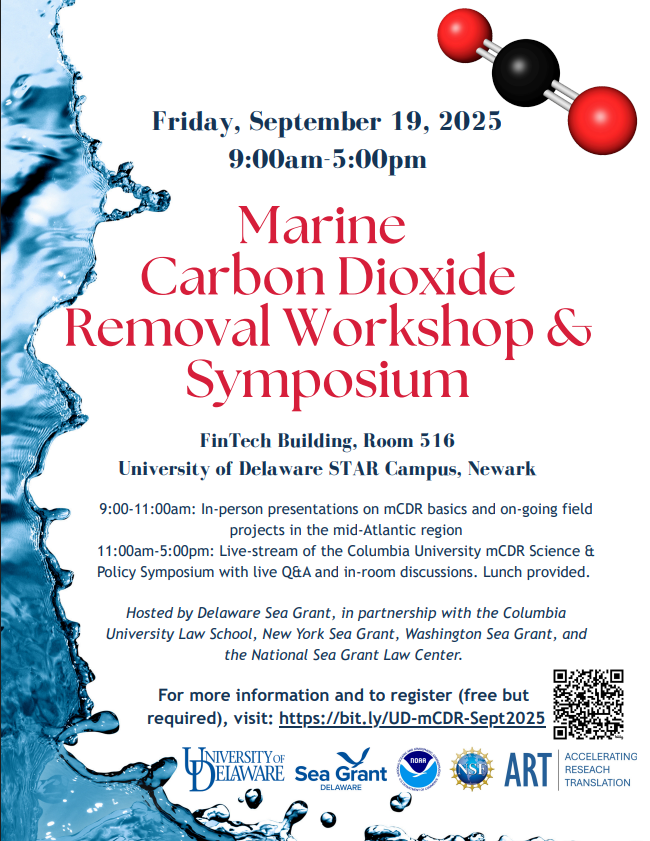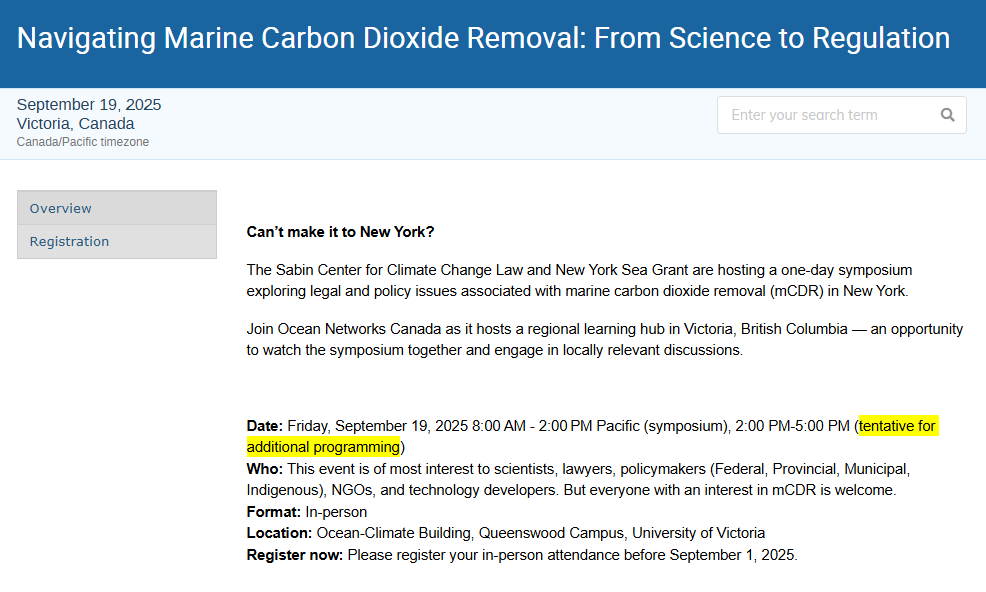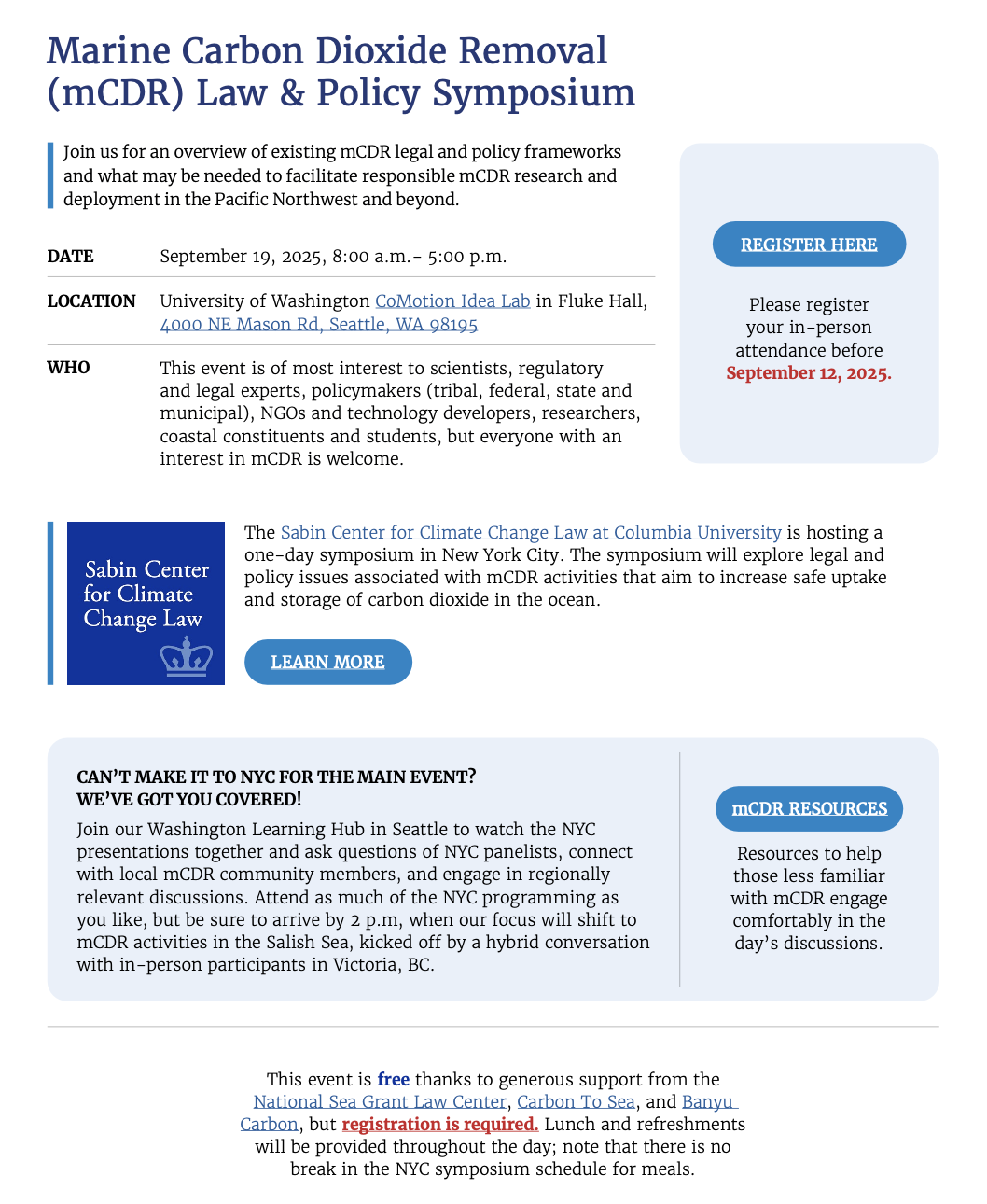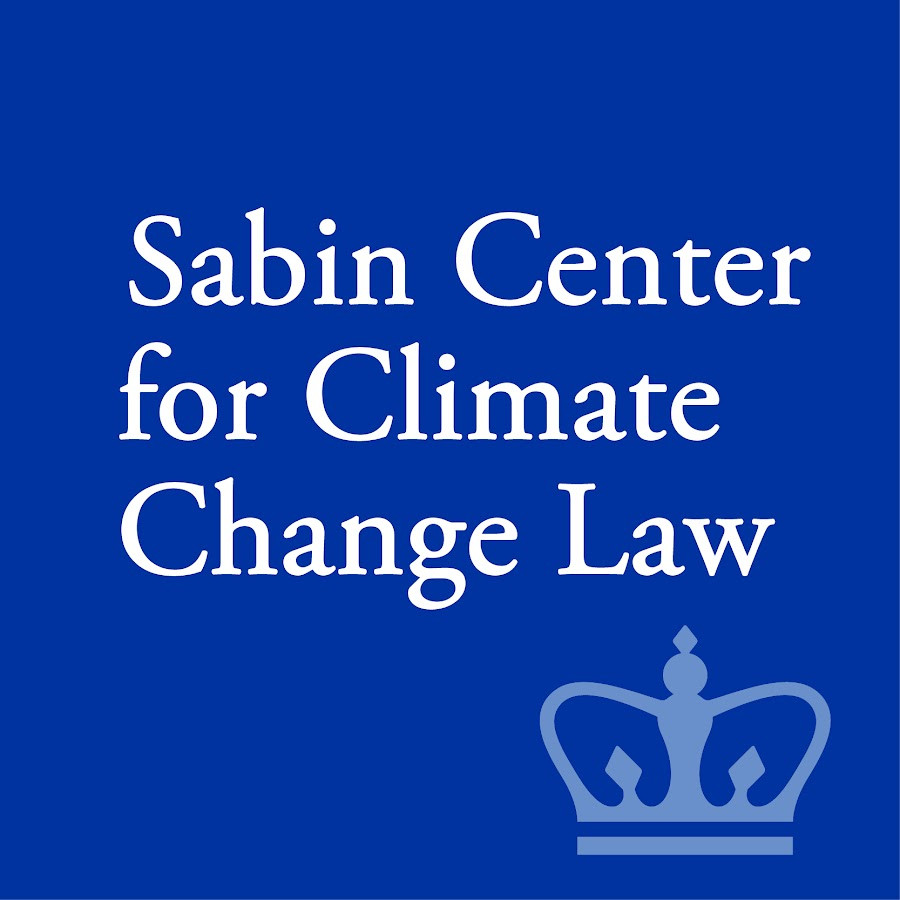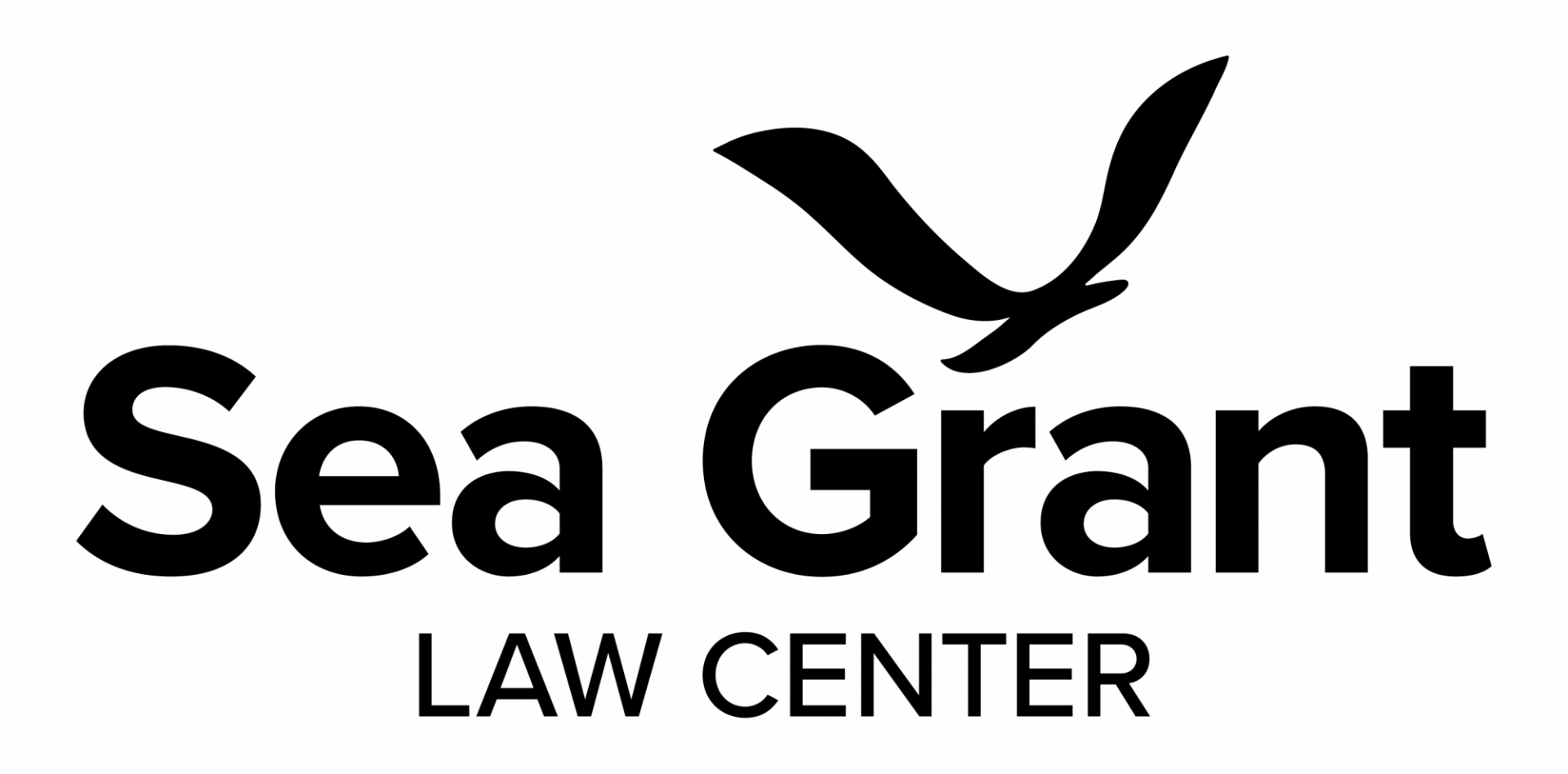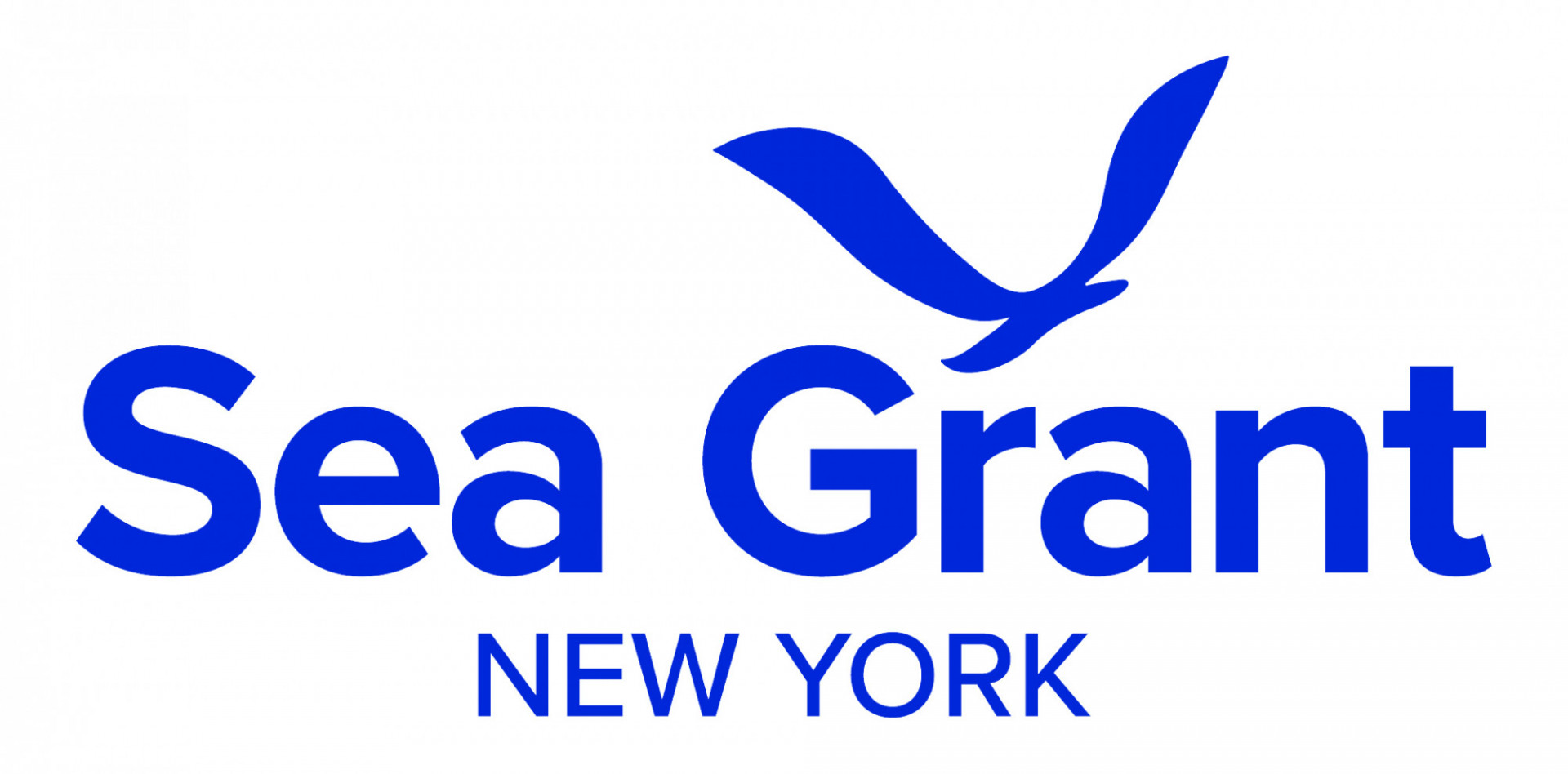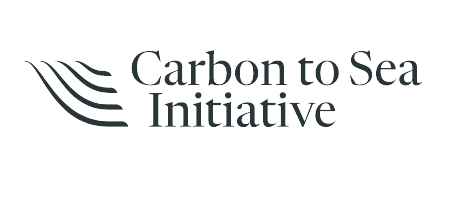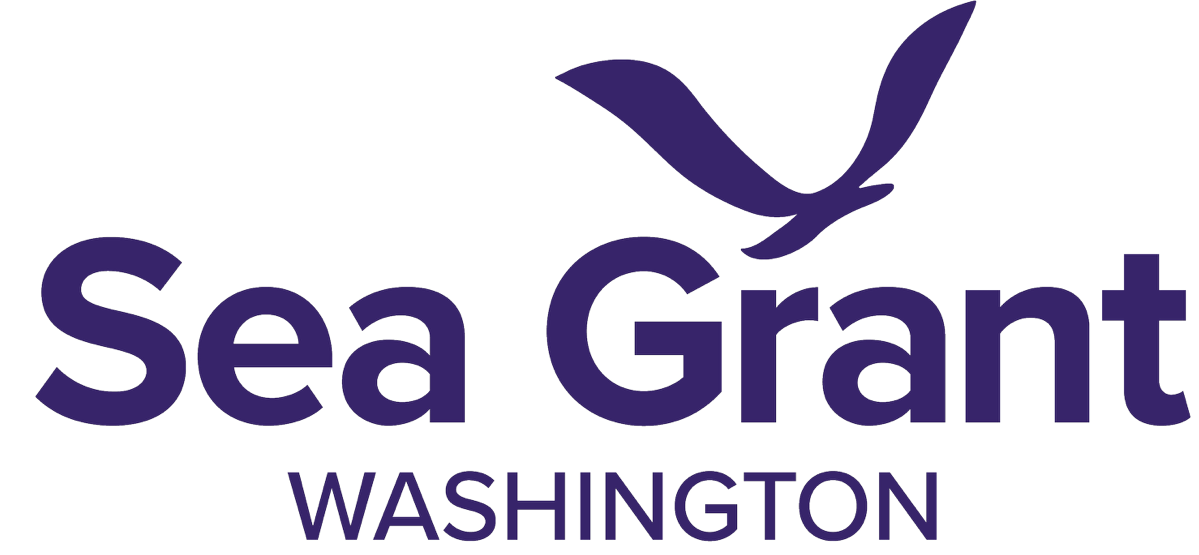On September 19, 2025, the Sabin Center for Climate Change Law and New York Sea Grant will host a one-day symposium exploring legal and policy issues associated with marine carbon dioxide removal (mCDR) activities that aim to increase uptake and storage of carbon dioxide in the ocean. The event, which is generously supported by the National Sea Grant Law Center and Carbon to Sea, will take place at Columbia Law School in New York City. We are also partnering with Washington Sea Grant, Delaware Sea Grant, and Ocean Networks Canada to host “regional learning hubs,” where individuals who are unable to travel to New York can come together to view the program and engage in their own regionally-relevant discussions.
The program will feature leading experts who will discuss the current legal and regulatory landscape for mCDR in the United States and internationally. It aims to bring together a wide range of stakeholders to explore the adequacy of existing legal and policy frameworks, and how they might need to evolve to better facilitate research and deployment. There will be a strong focus on ensuring a fair approach to mCDR development.
Symposium information
Agenda
11:00-11:15 AM ET (8:00-8:15 AM PT) Introductions
- Romany M. Webb, Sabin Center for Climate Change Law
- Catherine M. Janasie, National Sea Grant Law Center
- Diane Hoskins, Carbon to Sea Initiative
11:15-12:15 PM ET (8:15-9:15 AM PT) Panel 1: The State of the Science and Social Science on mCDR
Description: mCDR is a nascent but fast-developing field. The first panel will discuss the latest scientific research on mCDR, including assessments of its effectiveness in removing carbon dioxide from the atmosphere and potential social and environmental impacts (both positive and negative). Alongside this scientific discussion, the session will also explore social science considerations around mCDR, including public perceptions of different techniques, strategies for effective stakeholder engagement on projects, and more broadly, ways to ensure equitable implementation of mCDR.
Speakers:
- Gabby Kitch (moderator), YCNCC
- David Ho, University of Hawaii
- Adam Subhas, WHOI
- Celina Scott-Buechler, Duke University
12:15-12:30 PM ET (9:15-9:30 AM PT) Break
12:30-1:30 PM ET (9:30-10:30 PM PT) Lunchtime Discussion: mCDR and Other Ocean Users
Description: Depending on where and how they are conducted, mCDR activities have the potential to impact other ocean users and coastal communities. This lunchtime discussion will explore those interactions and innovative models for ensuring that individuals and communities affected by, or otherwise interested in, mCDR have an opportunity to shape its development and regulation. Fishery sector experts will discuss opportunities to develop a “fishery-friendly mCDR sector” and Tribal leaders will discuss the role of Indigenous communities in mCDR development.
Speakers:
- Brad Warren (moderator), Global Ocean Health
- Sarah Schumann, Fishery Friendly Climate Action Campaign
- Micah McCarty, Makah Tribal Council
1:30-1:45 PM ET (10:30-10:45 AM PT) Break
1:45-3:00 PM ET (10:45-12:00 PM PT) Panel 2: International Governance of mCDR
Description: This session will provide a broad overview of the current state of, and future directions for, international mCDR governance. A key focus will be on recent action on mCDR under the London Convention and Protocol and the potential application of the new treaty on Biodiversity Beyond National Jurisdiction to mCDR. We will also discuss ways to increase engagement and expertise in international discussions regarding mCDR and, in particular, the potential for greater Indigenous involvement.
Speakers:
- Wil Burns (moderator), American University
- Lina Roschel, RIFS
- Sara Seck, Dalhousie University
- Neil Craik, University of Waterloo
3:00-3:15 PM ET (12:00-12:15 PM PT) Break
3:15-4:45 PM ET (12:15-1:45 PM PT) Panel 3: U.S. Domestic Law and Policy on mCDR
Description: This panel will discuss key U.S. laws and policies applicable to mCDR. Speakers will discuss recent experience with obtaining permits for mCDR projects in the U.S. and the challenges and opportunities for permitting reform. We will also discuss how the public are involved in permitting decisions and ways to improve community engagement in the process. Finally, policy tools that are, or could be, used to support mCDR projects at the federal, state, local, and tribal levels will also be discuss. The overarching aim of the session will be to identify gaps, points of tension, and scope for improvements in U.S. law and policy.
Speakers:
- Korey Silverman-Roati (moderator), Sabin Center for Climate Change Law
- Doug Edwards, Vesta
- Paul Ticco, NYS Department of State
- Meghan Gavin, Carbon Containment Lab
- Ruth Driscoll-Lovejoy, Ocean Visions
4:45-5:00 PM ET (1:45-2:00 PM PT) Concluding Remarks
The symposium will close with a discussion on innovations in the field and future directions for mCDR governance.
Regional Learning Hubs
9:00-11:00 AM ET – Delaware/Mid-Atlantic mCDR Workshop
- mCDR “101”, with Q&A – Dr. Wei-Jun Cai, University of Delaware
- Elizabeth River carbon removal project - Dr. Jeremy Testa, University of Maryland Chesapeake Biological Lab
- A second mCDR project presentation, TBA
- Group discussion around the future of mCDR work in Delaware and the mid-Atlantic
11:00 AM-5:00 PM ET – Columbia University symposium live-streamed to our meeting room in Newark, with opportunities for live Q&A with Columbia presenters and our own in-room discussions
- Session 1: The State of the Science and Social Science Nationally
- Lunchtime Session: Lessons from Other Sectors
- Session 2: International Governance of Marine Carbon Dioxide Removal
- Session 3: U.S. Domestic Law and Policy on Marine Carbon Dioxide Removal
This session is jointly conducted by Washington Sea Grant and Ocean Networks Canada, and can be attended in-person at either of the two centers.
Salish Sea Session: Operating in Shared Waters
5:15-6:45 PM ET (2:15-3:45 PM PT) (remote for East Coast participants)
Description: This conversational session will consider what it means to conduct ’safe and responsible’ carbon dioxide removal in the Salish Sea and surrounding waters, which flow freely across the US-Canada border and have been home to sovereign Tribes and First Nations since Time Immemorial. Panelists will share perspectives and lessons from ongoing efforts, including Ebb Carbon’s commercial ocean alkalinity enhancement pilot in Port Angeles, WA, and Ocean Network Canada’s Solid Carbon New Frontiers research project off the coast of Vancouver Island.
Speakers:
- Kyla Westphal, Ebb Carbon
- Giulia Belotti, University of British Columbia
- Terre Satterfield, University of British Columbia
- Kohen Bauer, Ocean Networks Canada
- Devin Todd, Ocean Networks Canada
- Maia Hoeberechts, Ocean Networks Canada
- Moderator: Meg Chadsey, Washington Sea Grant
This session is jointly conducted by Washington Sea Grant and Ocean Networks Canada, and can be attended in-person at either of the two centers.
Salish Sea Session: Operating in Shared Waters
5:15-6:45 PM ET (2:15-3:45 PM PT) (remote for East Coast participants)
Description: This conversational session will consider what it means to conduct ’safe and responsible’ carbon dioxide removal in the Salish Sea and surrounding waters, which flow freely across the US-Canada border and have been home to sovereign Tribes and First Nations since Time Immemorial. Panelists will share perspectives and lessons from ongoing efforts, including Ebb Carbon’s commercial ocean alkalinity enhancement pilot in Port Angeles, WA, and Ocean Network Canada’s Solid Carbon New Frontiers research project off the coast of Vancouver Island.
Speakers:
- Kyla Westphal, Ebb Carbon
- Giulia Belotti, University of British Columbia
- Terre Satterfield, University of British Columbia
- Kohen Bauer, Ocean Networks Canada
- Devin Todd, Ocean Networks Canada
- Maia Hoeberechts, Ocean Networks Canada
- Moderator: Meg Chadsey, Washington Sea Grant
Registration
In-Person: The symposium will be conducted in-person at the Columbia Law School in New York City. This registration is only for in-person attendance at New York City. To register at a regional hub instead, please see below.
Regional Hubs: To broaden participation, Washington Sea Grant, Delaware Sea Grant, and Ocean Networks Canada will host regional learning hubs. These hubs will provide opportunities for individuals who are unable to attend in person to view the symposium remotely and participate in regionally focused discussions.
Washington Learning Hub: Register here, and flyer here. For any questions, contact Meg Chadsey ([email protected])
Delaware Learning Hub: Register here. For any questions, contact Christopher Petrone ([email protected])
Canada Regional Hub: Register here. For any questions, contact Devin Todd ([email protected])
Regional Hub Registration Links
Contact us
Ashwin Murthy: [email protected]
Social Media: https://bsky.app/profile/sabincenter.bsky.social
